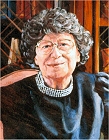
Click to see larger portrait


Click to see larger portrait
December 21, 1921 - November 18, 2002
While still in high school, Edith took a course in psychology taught by Abraham Luchins, then a graduate student in educational psychology at New York University. Thus began not only her lifelong interest in cognitive psychology as it applied to mathematics education, but also her lifelong collaboration with her future husband whom she married several months after graduating from college. After a year working in industry in support of the U.S. involvement in World War II, Luchins entered the graduate program in mathematics at New York University while her husband joined the army. She earned her M.S. degree in 1944 and became a doctoral student of Richard Courant. At the same time she also began teaching at Brooklyn College as an instructor in math.
Luchins' graduate work in mathematics was interrupted, however, by the birth of her first two children in 1946 and 1948. She completed her coursework at NYU but never took the comprehensive exams or wrote her thesis. She did manage to teach an evening math course at Brooklyn College for awhile. In 1949 the family moved to Montreal, Canada, when Abraham Luchins began teaching at McGill University. They remained in Montreal for five years. During that time Edith worked with her husband in the area of psychological issues in mathematics education.
In 1954, Abraham Luchins obtained a position at the University of Oregon. While raising four children, Edith resumed her mathematics studies at Oregon, receiving her Ph.D. in 1957 with a thesis entitled "On Some Properties of Certain Banach Algebras", written under the supervision of Bertram Yood. Her fifth child was born a year later. Parts of her dissertation were published in the articles "On strictly semi-simple Banach algebras" in the Pacific Journal of Mathematics, Vol. 9, No. 2 (1959), 551-554 [Abstract], and "On radicals and continuity of homomorphisms into Banach algebras", Pacific Journal of Mathematics, Vol. 9, No. 3 (1959), 755-758 [Abstract]. Both papers were prepared while Luchins held the New York State Fellowship, 1957-58, of the American Association of University Women.
Edith Luchins taught mathematics at the Rensselaer Polytechnic Institute from 1962 until her retirement in 1992. She was the first woman to be appointed a full professor at Rensselaer, and among the first tenured women full professors of mathematics at a major engineering school. During 1991-1992 she was a distinguished visiting professor of mathematics at the United States Military Academy in West Point. Even after retirement she continued her work with the Rensselaer mathematics department. In 1994 she was appointed an adjunct professor of cognitive sciences at Renssalaer. A well-loved teacher and colleague, Luchins received the Rensselaer Distinguished Teaching Award, the Darrin Counseling Award, the Martin Luther King Jr. Award, and the Rensselaer Alumni Association Outstanding Faculty Award. She also was awarded the Award for Distinguished Public Service at West Point. In 1998 she was made an honorary member of the international Society for Gestalt Theory and Its Applications. The Renssalaer Campus News obituary described her professional career as follows: "Luchins' research focused on mathematics and psychology. She had worked on mathematical models of order effects in information processing; on gender differences in cognitive processes and their implications for teaching and learning mathematics; and on the roles of heuristics and algorithms in mathematical problem solving, with and without the use of computers. She was also interested in the history of mathematics, and, in particular, the history of women in mathematics."
Luchins once directed an NSF study on why there are so few women in mathematics. Luchins and her Ph.D student, Mary Ann McLoughlin, studied and wrote about the mathematical life of Olga Taussky Todd. But she was also interested in many other areas of mathematics, such as number theory, cryptography, and geometry. For example, she received an NSF grant and a Rensselaer Teaching Fellowship to integrate geometry and calculus through computer graphics. Luchins wrote 12 books or monographs and over 70 articles, many with her husband.
Edith Luchins was an active member of Congregation Beth Abraham Jacob in Albany, New York, where she did pioneering work in Jewish communal life. She was the first woman selected to serve on the Board of Directors of the Orthodox Union.
Photo Credit: Painting of Edith Luchins used with permission of Anne Greenfield